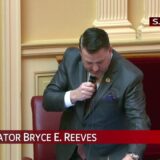A New York court ruled in favor of Leafly Holdings and other plaintiffs that the state’s ban on third-party cannabis marketing is unconstitutional, striking down advertising rules, after the ruling initially invalidated all of the state’s adult-use regulations.
Last September, a lawsuit filed by the plaintiffs Leafly Holdings, adult-use retailer Stage One Dispensary, and a customer who uses Leafly to inform her decisions about cannabis purchases challenged New York’s ban on third-party advertisers. Specifically, the plaintiffs sued over rules that banned third-party marketing for cannabis companies—think apps and platforms like Weedmaps and Leafly. Leafly documents over 5,000 cannabis strains and shows their terpene profiles, lineage, and effects among other data that can make choosing a strain safer.
The Office of Cannabis Management (OCM) regulations on non-plant-touching third-party platforms, as is, would essentially block Leafly from doing business in New York. In the lawsuit, Leafly cited several allegedly problematic rules including one that bans retailers from paying for “marketing or promotion through a third-party platform, marketplace, or aggregator that lists cannabis products for sale”; and another that bans licensees from contracting with a “person or entity performing any function or activity directly involving the licensed activities authorized for the license type.”
State Supreme Court Justice Kevin R. Bryant ruled in favor of the plaintiffs Thursday, declaring that the New York cannabis industry’s rules are arbitrary, capricious, and therefore unconstitutional. Bryant’s April 4 decision invalidates OCM cannabis regulations parts 118-121, 123-125, and 131, saying that the OCM failed to show evidence to justify how the rules were developed.
“We are reviewing the decision and exploring all possible legal options,” a representative of the OCM told High Times Friday morning.
Leafly Holdings, Inc., et. al v. New York State Office of Cannabis Management, et. al reads, “For the foregoing reasons, the petition is granted, and the following sections are hereby declared null and void as arbitrary and capricious; The Third-Party Marketing Ban, Parts 9 N.Y.C.R.R. §§123.10(g)(21) and 124.5(a); the Pricing Ban, 9 N.Y.C.R.R. §124.1(b)(5)(ii) the Third-Party Order Ban, 9 N.Y.C.R.R. §123.10(g)(23); the Third-Party All-Licensee Listing Mandate, 9 N.Y.C.R.R. §124.l(b)(2); and the Third-Party Distributor Listing Mandate, 9 N.Y.C.R.R. §124.l(c)(l)-(2),” Honorable Kevin R. Bryant, J.S.C. Ruled. The original sweeping order appeared to invalidate all of New York’s adult-use rules, however the ruling was quickly clarified to apply only to marketing rules by the end of the day.
Leafly was more than pleased with the news. “It’s impossible to overstate the importance of providing consumers with choices, and educational information when making purchasing decisions,” the company said in a statement. “It is critically important that licensed retailers have equal access to important advertising and marketing tools to help them succeed in a competitive landscape.” Leafly didn’t immediately respond to High Times for comment.
Did the Ruling Invalidate New York’s Cannabis Regulations?
For a few hours on Thursday, the ruling invalidated or appeared to invalidate the whole of New York’s cannabis regulations as it was originally written. Syracuse.com reports that Judge Bryant’s “jaw-dropping decision” applied to the regulations broadly, and it “strikes down all New York recreational cannabis rules.” Chris Roberts for MJBizDaily wrote that the decision could send New York’s into “chaos” as it was unclear if cannabis businesses could be operated without any rules in place, or what else might happen.
Some people were happy to see the rules get tossed. Why? Lawsuits and bureaucratic problems have left New York’s adult-use cannabis market in bedlam. Only about two dozen legal dispensaries are open, as oversupply from farmers stacks up and black market shops step in to fill the void. Even Gov. Kathy Hochul called it a “disaster” so some didn’t exactly shed a tear when it appeared the rules were invalid.
State Sen. Jeremy Cooney, chair of the Senate’s cannabis subcommittee, was among those who quickly slammed the ruling, before the ruling was amended.
“Today’s State Supreme Court decision was another setback in a series of blows New York’s adult-use cannabis market has faced since legalization, three years ago,” he wrote in a statement. “While some changes to marketing regulations are needed, the decision by the Court to throw out all agency regulations will ultimately slow progress at a time when we need to more aggressively combat illicit shops to grow a stronger, more-equitable legal market.”
Fox News reports that the court “dramatically scaled back his order from the previous day that had invalidated most of the state’s cannabis regulations in a case challenging rules for advertising marijuana.”
Now that the court has clarified that the ruling only applies to marketing and advertising rules, it demonstrates how Leafly’s win will open up the doors to third-party companies looking to expand into New York’s market.




















